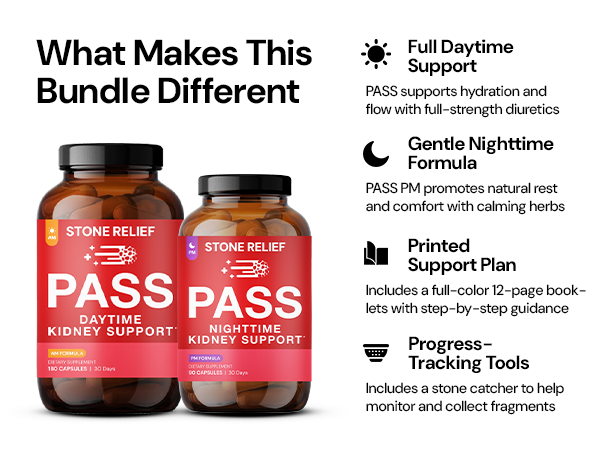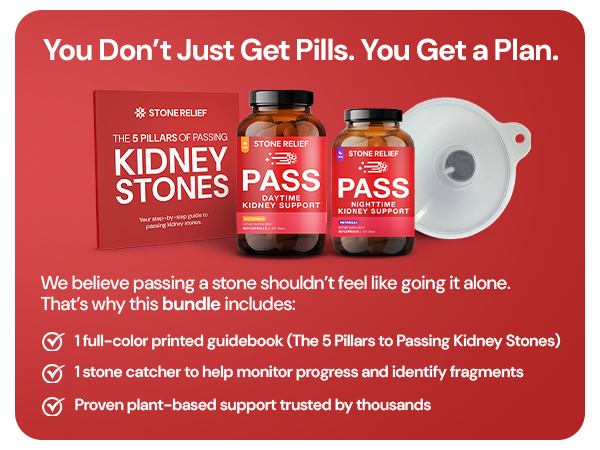How an Enlarged Prostate Triggers Kidney Stones
Prostate issues like BPH are incredibly common in men over 40—but few realize they can also contribute to kidney stone formation. While not a direct cause, enlarged prostates slow urine flow and increase the risk of urinary tract infections, both of which can set the stage for stones. In this blog, you’ll learn the link between prostate health and kidney stones, and how changing your diet may help prevent both.
Key Takeaways
-
BPH affects over 50% of men over 50 and restricts urine flow
-
Slow or incomplete urination increases stone-forming risk
-
UTIs from BPH can contribute to calcium phosphate and struvite stones
-
Dietary changes can reduce both prostate issues and stone risk.
We all know that urine flow is a key factor in kidney stone formation.
But if you're a man over 40, there’s something else you need to consider: your prostate.
As men age, prostate enlargement—most commonly Benign Prostatic Hyperplasia (BPH)—can silently increase the risk for kidney stones, especially those forming lower in the urinary tract.
Let’s break down how it happens and what you can do about it.

Understanding the Prostate’s Role
The prostate gland surrounds the urethra, the tube that carries urine from the bladder out of the body.
Its main job is to produce seminal fluid, but as it enlarges, it begins to press inward on the urethra. This compression leads to urine flow problems, which may not seem dangerous at first—until you consider the impact on your kidney stone risk.
What Is BPH and How Common Is It?
Benign Prostatic Hyperplasia is non-cancerous prostate enlargement.
-
Starts around age 40
-
Affects 50% of men over 50
-
Affects 80% of men over 75
That means most men will deal with this condition at some point.
Common Symptoms Include:
-
Frequent urination
-
Difficulty starting or stopping urination
-
Weak urinary stream
-
Incomplete bladder emptying
These symptoms can all contribute to urine retention and stagnation, a dangerous combo when it comes to kidney stone risk.
🛒 Check Price & Purchase Stone Relief Pass AM/PM Bundle on Amazon
Is There a Direct Link Between Prostate Issues and Kidney Stones?
Technically, no.
There’s no direct mechanism where an enlarged prostate forms kidney stones.
But indirectly? Absolutely.
Here’s how it works.
1. Reduced Urine Flow = Higher Stone Risk
When urine doesn’t flow freely, stone-forming minerals like calcium and uric acid are given more time to crystallize.
The slower the flow, the greater the risk. This is especially true when:
-
Bladder doesn’t fully empty
-
Stream is weak
-
Urine sits longer in the bladder
2. Increased UTI Risk
An enlarged prostate can cause urine retention, which often leads to urinary tract infections (UTIs).
And UTIs open the door to struvite stones and calcium phosphate stones, both of which thrive in infected or stagnant urine.
So while your prostate may not form stones directly, it sets the stage for the perfect storm.
3. Most Stones from Prostate Issues Form in the Bladder
This one surprises a lot of men.
When urine can’t fully exit the bladder due to prostate pressure, stone-forming elements pool at the bottom, where they crystallize over time.
That’s why these stones don’t often originate in the kidneys—they form lower down, right in the bladder.
What’s Causing Prostate Enlargement in the First Place?
Modern research doesn’t fully understand what triggers BPH. But we do know that:
-
DHT (dihydrotestosterone) plays a role
-
Erectile dysfunction may be linked
-
Diet and insulin resistance are major contributors
In fact, 87% of the population today suffers from some form of metabolic dysfunction, and insulin resistance is like miracle grow for your prostate.
🛒 Check Price & Purchase Stone Relief Pass AM/PM Bundle on Amazon
The Bigger Problem: Metabolic Dysfunction
Here’s where the connection to kidney stones gets stronger.
Poor dietary choices lead to:
-
Insulin resistance
-
Abdominal obesity
-
High blood pressure
-
Elevated blood sugar
These aren’t just risk factors for prostate growth—they’re also directly tied to calcium oxalate and uric acid kidney stone formation.
So if you’re dealing with both BPH and kidney stones, chances are your diet is to blame for both.
Fix the Food, Fix the Flow, Fix the Stones
Making changes to your diet isn’t easy.
I know because I’ve spent over a decade self-experimenting with different approaches to stop my kidney stones for good.
Now I’ve been stone-free for over six years—and what worked wasn’t magic. It was just getting rid of the ultra-processed junk and eating in a way that supported both kidney and metabolic health.
For men struggling with BPH, kidney stones, or both, the path forward is the same:
-
Eliminate processed sugars and seed oils
-
Avoid refined grains and high-carb snacks
-
Eat animal-based whole foods
-
Stay hydrated consistently throughout the day
Not only does this help reduce your insulin load, but it also supports healthy urine flow and bladder function—giving your prostate a break and your kidneys a cleaner system to work with.
🛒 Check Price & Purchase Stone Relief Pass AM/PM Bundle on Amazon
Final Thoughts: Don’t Ignore the Prostate-Stone Connection
If you’re over 40 and dealing with kidney stones, your prostate health needs to be on your radar.
While BPH doesn’t directly cause stones, the urine flow restriction it creates sets up the perfect conditions for stones to form—especially in the bladder.
The best part? You can turn things around with simple but powerful changes to your diet.








